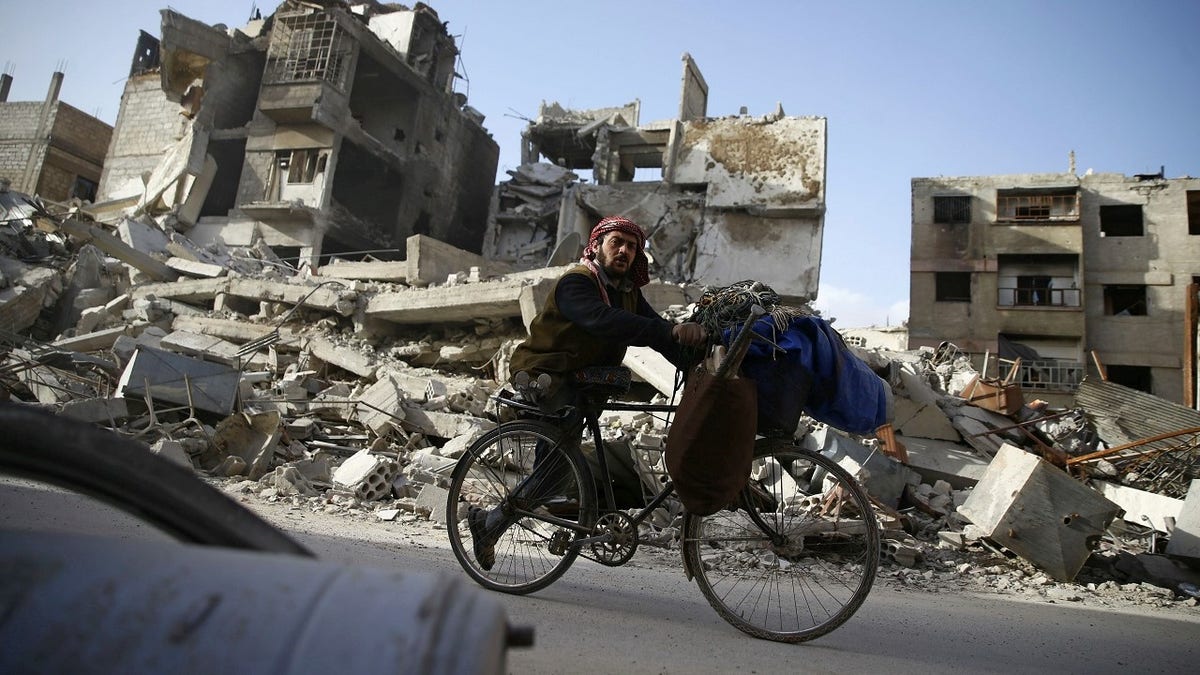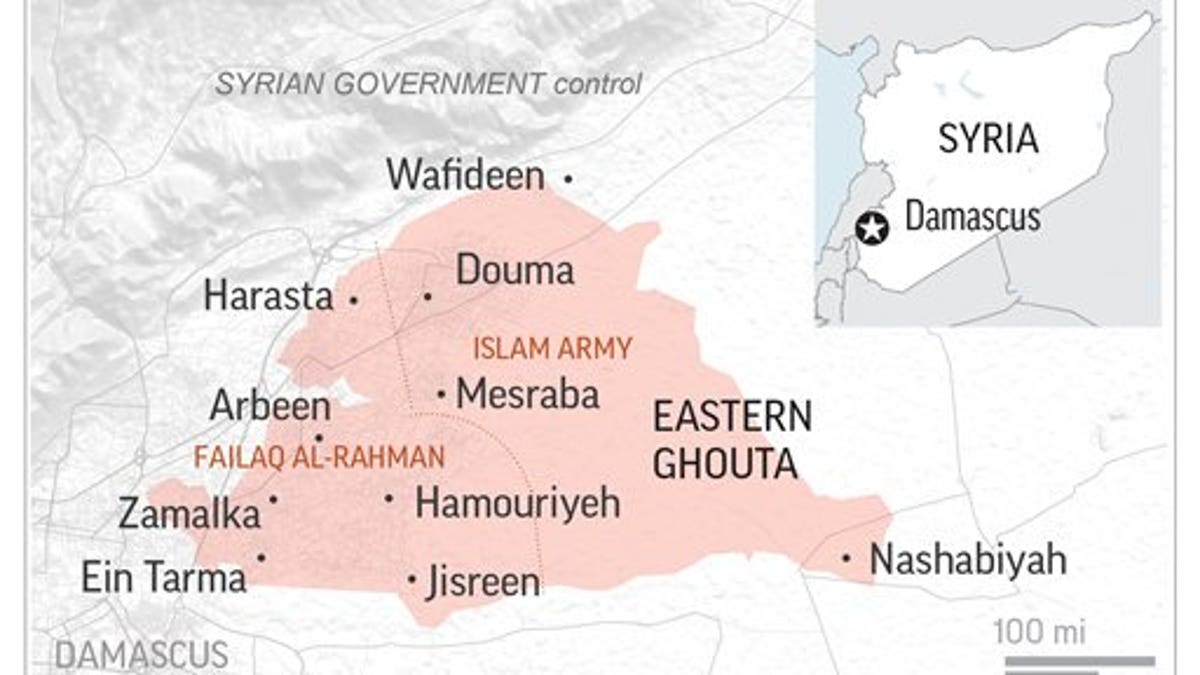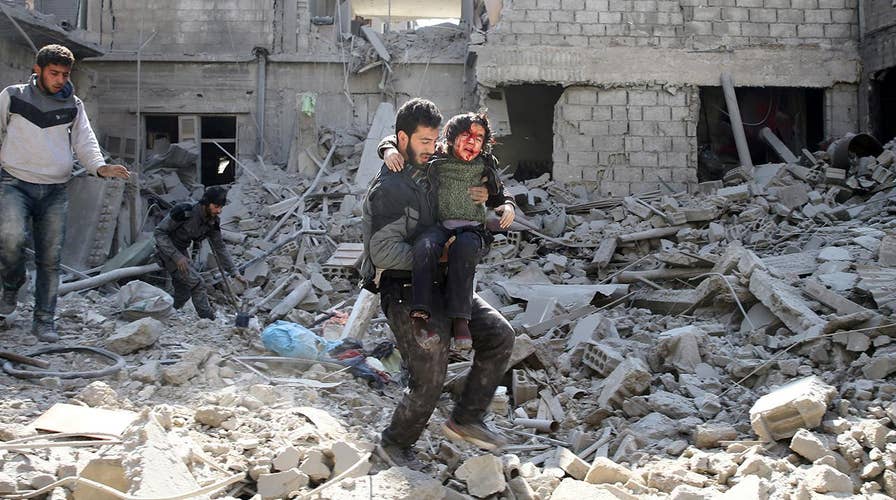Atrocities in Ghouta, Syria: What to know
A look at the Syrian war’s impact in Eastern Ghouta and the catastrophic violence happening there
As the Assad regime continues to defy a Feb. 24 United Nations Security Council-mandated ceasefire in the Damascus suburbs known as eastern Ghouta, at least one American citizen and her family are huddled in a small basement in the enclave, terrified of the consequences of Assad’s further advance.
Deana Lynn, 44, a native of Detorit’s northern suburbs, is now a besieged resident northeast of the Syrian capital, in a region where more than 1,000 people have been killed in the past month by air and artillerty strikes, including alleged chlorine gas attacks.
“The situation is really bad, the worst ever” she told Fox News, in an online conversation. “The Syrian forces are coming very close. We can hear the gunfire. We are afraid of a slaughter, or torture.” Throughout the conversation she suffered from a persistent cough—a combination, she said, of illness and breathing the dust of frequent heavy bombardment.
Deana has been a resident of Syria since “before 2000,” when she left Michigan with her husband, a native of Syria, to rejoin his family in vastly more peaceful times.
For most of that time, as violence escalated, she kept “a low profile,” as she put it—but that has changed as the U.N.-sponsored ceasefire has proved to be an illusion, and regime attacks have increased in ferocity. Now she denounces Assad’s atrocities on Twitter and pleads for the international community to do more than merely denounce its barbarisms.
So far, to no avail. On Monday, March 12, U.S. Ambassador to the U.N. Nikki Haley once again denounced the continuing Syrian violence, declaring that “this is no ceasefire. This is the Assad regime, Iran, and Russia continuing to wage war against their political opponents.”

Syria's eastern Ghouta under fire
United Nations Secretary General Antonio Guterres also told the Security Council that he was “deeply saddened by the immense loss and cascading suffering of the Syrian people, and added that he was “deeply disappointed by all those who have, year after year, by action or inaction, by design or indifference, allowed this to happen.”
Aside from that, nothing that hints at relief. As Arnaud Qhemin, country director for Syria of one of the biggest U.S. based relief organizations, Mercy Corps, put it,“ We have seen nothing but carnage in response to the Security Council’s resolution calling for a halt to the massacre in eastern Ghouta. Conditions worsen each day. People are fleeing from one shelter to another as the front lines move.”
For Deana, life has become a perilous shuttle up and down stairs in her ravaged apartment building whenever bombing attacks in her neighborhood make movement possible.
Much of her time is spent in a small basement that serves as a bedroom-cum-bomb shelter where she cares for her eight children—“seven girls and a boy”—and two grandchildren. When conditions allow she climbs upstairs to her, where it is still possible to cook and there is water available, along with electricity, which she buys from a still-functioning generator.

Map of eastern Ghouta, Syria.; 2c x 2 1/2 inches; 96.3 mm x 63 mm;
“We have food,” she told Fox News, “but we have a problem with malnutrition.” Her husband is working as a communal cook in the besieged area—she did not answer other specific questions about him, possibly in fear of future retaliation.
(As Amb. Haley noted, the Assad regime has declared all resistance groups in eastern Ghouta to be “terrorists,” a blanket designation that provides a fig leaf for the targeting of innocent civilians, schools and hospitals.)
Medicine is another problem. A U.N. relief convoy—the first allowed by Assad to the eastern Ghouta town of Douma for a month—was able to unload 13 trucks of food supplies during visits on March 5 and March 9. But as usual, most medical supplies were removed in advance from the U.N. shipment by Assad’s military.
So far, Deana has been lucky: Her apartment building has been relatively unscathed, though she says a tenant of the building’s top floor was killed in one attack. “Right now our children are safe,” she said. “At the moment.”
It is painfully clear that she never expected the violence to escalate as fiercely and quickly as it did after Syrian protests began in 2011. Her U.S. passport—she sent a copy of the information page to Fox News—expired in 2004; those of five of her children expired in 2005. “We didn’t renew them,” she said.
“When she and her husband moved to Syria, I don’t believe they planned to come back,” said her brother Jamil, a mechanic who lives in Pontiac, Michigan. “His parents were getting old. They had property. Once children get acclimated to a situation it’s hard to move them.”
“Then things escalated so fast that they didn’t realize how bad it was getting.”
While diplomats wring their hands in impotent dismay, it is getting much worse.

